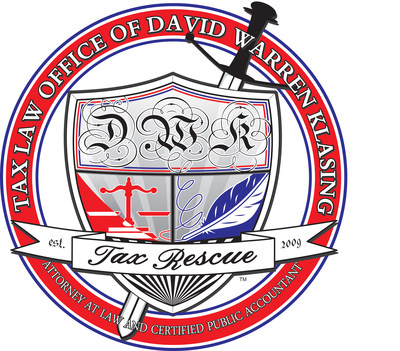From the Tax Law Offices of David W. Klasing - Should You Report Cryptocurrency on FATCA Form 8938?
IRVINE, Calif., Feb. 18, 2025 /PRNewswire/ -- Over the past decade, cryptocurrency has gone from being an obscure form of technological investment to being bought and sold on its own exchanges and even used to pay for goods and services by some individuals & large corporations. As it has become a more common asset among your average investors, these folks have had many questions about the tax implications of investing in cryptocurrency, or virtual currency, as it is also known. The answers can be somewhat complicated, which is why it is always a good idea to consult with an experienced virtual currency tax attorney and CPA like those at the Law Offices of David W. Klasing before filing your returns if you have any cryptocurrency investments. Situations involving cryptocurrency held in foreign accounts or exchanges can be even more tricky, and there is not always a straight answer from the IRS. Though this article runs through the basics of such a situation, it cannot be substituted for the legal expertise of one of our attorneys, who has reviewed the specifics of your problem.
What is Cryptocurrency?
Cryptocurrency is a decentralized virtual currency. Unlike traditional currency, it exists independently of any government or financial institution. Additionally, it can be sent between users without passing through a central authority, such as a bank or payment gateway. Transactions are made directly between the sender and receiver, eliminating transfer fees and other charges typically rendered by banks.
An actual "bitcoin" or other form of virtual currency is just a computer code that has been encrypted so that it can only be read by the sender and the receiver. Once received, it functions like a computer file that can be stored in a digital wallet application on your phone or computer. These transactions are powered by an open-source code called a blockchain. A blockchain is essentially a digital ledger of all transactions involving Bitcoin that is entirely public and transparent. Each transaction is a "block" that is "chained" to the code. Individuals known as Bitcoin "miners" then use high-speed computers to digitally confirm the transaction, creating a permanent record of all transactions that occur and making fraud extremely difficult.
While Bitcoin was the first and is the most well-known form of cryptocurrency using blockchain technology, many others have followed in its wake. The availability of these forms of digital currency is often limited because, unlike paper currency, they are not printed in unlimited amounts. These types of cryptocurrency can be acquired in multiple ways, including through online cryptocurrency exchanges, some of which are based in foreign countries.
In the current digital era, the purchase, sale, and everyday use of cryptocurrency have become widespread. Unlike traditional bank transfers, virtual currency transactions typically occur between two parties directly—potentially reducing fees and increasing privacy. However, holding crypto in foreign exchanges or accounts creates additional reporting obligations, especially under FATCA and (possibly, in the near future) the FBAR regime.
What are the FATCA Tax Reporting Requirements?
Under the Foreign Account Tax Compliance Act (FATCA), U.S. taxpayers who meet certain thresholds of money and assets in overseas or offshore bank and financial accounts are required to make a disclosure each year on Form 8938. For unmarried couples, the threshold is $50,000 or more on the last day of the tax year or more than $75,000 at any time during the tax year. For those who are married and filing a joint return, the thresholds are $100,000 or more on the last day of the tax year or more than $150,000 at any time during the tax year. If you are married and filing separate income tax returns, the thresholds are $50,000 or more on the last day of the tax year or more than $75,000 at any time during the tax year.
Form 8938 must be attached to your individual tax return (Form 1040) by the same due date (including any extensions). The IRS imposes different thresholds for different filing statuses and for taxpayers living abroad. Determining the maximum value of cryptocurrency in U.S. dollars—particularly with volatile markets—can be tricky, but conservatism in valuations is often advisable to avoid underreporting. If an exchange does not provide a traditional account number or address, the IRS typically permits you to list your login credentials or note an "unknown" address. If you are unsure whether you must disclose on Form 8938, it is always best to reach out before filing to an experienced tax attorney and CPA like those on the team at the Tax Law Offices of David W. Klasing.
Specified Foreign Financial Assets
FATCA focuses on "specified foreign financial assets," which generally include both foreign financial accounts and foreign non-account assets held for investment. Examples of such assets include (but are not limited to):
- Foreign stock and securities
- Foreign financial instruments
- Contracts with non-U.S. persons
- Interests in foreign entities
If these assets meet or exceed FATCA's value thresholds, you must disclose them on Form 8938. Though it is crucial to act quickly if you have received a FATCA letter from an overseas bank, you should consult with an international tax lawyer before proceeding because the way you respond could impact how swiftly and severely you are penalized.
Must Cryptocurrency Be Reported Under FATCA Requirements?
FATCA applies to all foreign assets, so the question becomes whether a personal account on a foreign crypto exchange counts or in some other foreign financial or banking institution counts as a foreign asset. Tax experts and lawyers have made arguments both ways, but the IRS has given no clear answer or directions. While they have not officially said that crypto wallets or accounts on foreign exchanges count as foreign assets, they also have never said for certain that they do not count. As such, our attorneys and CPAs are likely to advise you to disclose this information on Form 8938 just to be safe and to prevent any potential headaches down the line. However, each situation is different, and you should not make any decision about whether or not to report without having a skilled tax lawyer like those at the Tax Law Offices of David W. Klasing review the specifics of your case and advise you on exactly what to do in our situation.
FBAR and FATCA: Key Distinctions for Foreign-Held Crypto
FBAR (FinCEN Form 114) traditionally applies to foreign financial accounts holding cash or cash equivalents exceeding $10,000 in the aggregate. Currently, the regulations do not explicitly consider a crypto-only account to be FBAR-reportable. However, FinCEN Notice 2020-2 signals a plan to amend the rules so that purely crypto-based accounts will become reportable under the Bank Secrecy Act. In contrast, FATCA (Form 8938) focuses more broadly on "foreign financial assets," potentially encompassing foreign-held crypto. If an overseas crypto "account" also holds fiat currency like euros or dollars (a "hybrid account"), then FBAR obligations likely already apply. Taxpayers should watch for further updates to confirm new reporting requirements, significantly since noncompliance with either FBAR or FATCA can trigger steep penalties.
The High-Stakes Consequences of Not Filing Form 8938
Even if the rules around cryptocurrency reporting seem ambiguous, failing to file Form 8938 when required exposes you to significant risks. Here are some key points to consider:
- Immediate Penalty: Taxpayers who omit Form 8938 and are subsequently notified by the IRS face an initial penalty of $10,000. If you fail to submit the form within the designated period (typically 90 days after notification), this penalty can increase in additional increments of $10,000—potentially reaching a maximum of $50,000.
- Extended Statute of Limitations: When Form 8938 is not filed, the statute of limitations for IRS audits on that tax year does not begin. This means the IRS retains the authority to audit and assess additional tax liabilities for that year indefinitely, prolonging your exposure to potential enforcement actions.
- Increased Accuracy Penalty: If an audit later reveals inaccuracies or understatements in your reported foreign assets due to the omission of Form 8938, the accuracy-related penalty can jump from the standard 20% to as high as 40% of the underpaid tax. This can significantly compound your overall financial liability.
- Limited Professional Expertise: Many CPAs, tax preparers, and accountants may not fully understand the intricate requirements of Form 8938, especially as they pertain to the complexities of cryptocurrency and other foreign assets. This knowledge gap increases the likelihood of unintentional noncompliance, leaving you vulnerable to severe civil and criminal tax penalties.
- Potential Criminal Tax Exposure: In cases where noncompliance is deemed willful, the failure to file Form 8938 can also trigger clandestine IRS-CID criminal tax investigations, potentially leading to more serious consequences beyond civil tax penalties.
In short, overlooking or delaying the filing of Form 8938 not only subjects you to hefty fines and protracted audits but also leaves you with indefinite exposure to IRS enforcement actions. Timely and accurate compliance with Form 8938 is essential to protect yourself from these significant risks.
Why Choose the Tax Law Offices of David W. Klasing for International Cryptocurrency and Foreign Asset Compliance?
It is easy for taxpayers to become lost in the sea of acronyms, tax forms, deadlines, and reporting obligations arising from FATCA, FBAR, and foreign cryptocurrency compliance. Even seemingly minor missteps can result in debilitating penalties, and in severe cases, taxpayers may face life-altering criminal tax prosecution. If you have undisclosed crypto assets abroad, the best time to consult with an experienced, dually certified Tax Attorney-CPA is today—before the IRS initiates a high-risk civil tax audit or a criminal tax investigation.
Note: As long as a taxpayer that has willfully committed tax crimes (potentially including substantial amounts of non-reported cryptocurrency income) self-reports the tax fraud (including a pattern of non-filed returns) through a domestic or offshore voluntary disclosurebefore the IRS has started an audit or criminal tax investigation/prosecution, the taxpayer can ordinarily be successfully brought back into tax compliance and receive a nearly guaranteed pass on criminal tax prosecution and simultaneously often receive a break on the civil penalties that would otherwise apply.
It is imperative that you hire an experienced and reputable criminal tax defense attorney to take you through the voluntary disclosure process. Only an Attorney has the Attorney-Client Privilege and Work Product Privileges that will prevent the very professional that you hire from being potentially being forced to become a witness against you, especially where they prepared the returns that need to be amended in a subsequent criminal tax audit, investigation or prosecution.
Moreover, only an Attorney can enter you into a voluntary disclosure without engaging in the unauthorized practice of law (a crime in itself). Only an Attorney trained in Criminal Tax Defense fully understands the risks and rewards involved in voluntary disclosures and how to protect you if you do not qualify for a voluntary disclosure.
As uniquely qualified and extensively experienced Criminal Tax Defense Tax Attorneys, KovelCPAs and EAs, our firm provides a one stop shop to efficiently achieve the optimal and predictable results that simultaneously protect your liberty and your net worth. See our Testimonials to see what our clients have to say about us!
At the Tax Law Offices of David W. Klasing, we bring together decades of high-level accounting and tax law experience with a specific focus on international tax representation and enforcement defense. Our dedicated team of dual-licensed tax attorneys, CPAs, and EAs has guided thousands of individuals and businesses through FATCA, FBAR, and related disclosure hurdles. By acting swiftly and proactively, you may significantly reduce the penalties you risk incurring under these complex regimes. Whether you need immediate assistance in amending prior returns, navigating streamlined filing procedures, or negotiating potential criminal tax exposure, our firm can help you find the safest and most strategic solution. We will do everything in our power to make sure that you are paying as little as possible in taxes while also meeting all the legal reporting requirements. For a reduced-rate initial consultation, contact us online or call our law offices at (888) 904-4096.
Here is a link to our YouTube channel: click here!
See our FBAR Compliance and Disclosure Q and A Library
See our Foreign Audit Q and A Library
Public Contact: Dave Klasing Esq. M.S.-Tax CPA, dave@taxesqcpa.net
![]() View original content to download multimedia:https://www.prnewswire.com/news-releases/from-the-tax-law-offices-of-david-w-klasing---should-you-report-cryptocurrency-on-fatca-form-8938-302378362.html
View original content to download multimedia:https://www.prnewswire.com/news-releases/from-the-tax-law-offices-of-david-w-klasing---should-you-report-cryptocurrency-on-fatca-form-8938-302378362.html
SOURCE Tax Law Offices of David W. Klasing, PC


